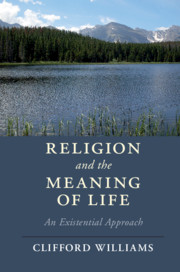Book contents
- Religion and the Meaning of Life
- Cambridge Studies in Religion, Philosophy, and Society
- Religion and the Meaning of Life
- Copyright page
- Contents
- Acknowledgments
- Introduction
- 1 Why Should We Care about Meaning?
- 2 Boredom
- 3 Denial of Death
- 4 Acquiring Meaning
- 5 Suicide
- 6 The Divine One
- 7 Life after Death
- 8 Obstacles
- 9 How Should We Live So as to Die Well?
- Epilogue Facts the Heart Can Feel
- Notes
- References
- Index
5 - Suicide
Published online by Cambridge University Press: 23 March 2020
- Religion and the Meaning of Life
- Cambridge Studies in Religion, Philosophy, and Society
- Religion and the Meaning of Life
- Copyright page
- Contents
- Acknowledgments
- Introduction
- 1 Why Should We Care about Meaning?
- 2 Boredom
- 3 Denial of Death
- 4 Acquiring Meaning
- 5 Suicide
- 6 The Divine One
- 7 Life after Death
- 8 Obstacles
- 9 How Should We Live So as to Die Well?
- Epilogue Facts the Heart Can Feel
- Notes
- References
- Index
Summary
Chapter 5 asks two questions: Does finding a meaning for life prevent people from killing themselves? Do any of the four ways of acquiring meaning described in Chapter 4 prevent people from killing themselves? The first question has rarely been asked by philosophers. Albert Camus, in his The Myth of Sisyphus, was an exception, but his thoughts are limited only to the first way of acquiring meaning - achieving goals. The suicidal persons whose stories I tell in the chapter regarded only the last way of acquiring meaning - loving and being loved - to be what helped them deal with their suicidal impulses. They did so because the first three ways of acquiring meaning were largely irrelevant to their emotional pain. Chapter 5 also asks whether believing in God prevents people from killing themselves. The answer is that it can and sometimes does.
Keywords
- Type
- Chapter
- Information
- Religion and the Meaning of LifeAn Existential Approach, pp. 79 - 96Publisher: Cambridge University PressPrint publication year: 2020

